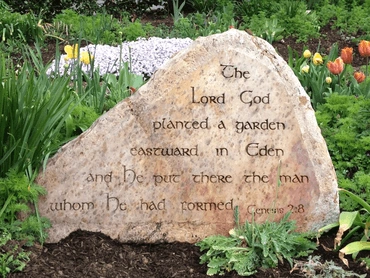15
And Jehovah God taketh the man, and causeth him to rest in the garden of Eden, to serve it, and to keep it.
15
And Jehovah God taketh the man, and causeth him to rest in the garden of Eden, to serve it, and to keep it.
Durch Brian David

In some ways, this verse expresses the pinnacle of human existence, the most beautiful, joyous state we have ever experienced: people at their purest and most loving living in a state of love and wisdom given them by the Lord.
This happened thousands of years ago, before the beginning of recorded history, in what the Writings call the Most Ancient Church, represented here by "man." A garden represents the intellect and Eden represents love, so the man in the Garden of Eden represents people pure of heart in a state of love to the Lord and the wisdom that comes from that love.
It's interesting that the man is to "dress" the garden ("serve" would be a more literal translation) and "keep" it. "Serving" in the Bible generally represents a more external spiritual state serving a more exalted one. "Keeping" means expressing higher spiritual things through lower ones, including external forms of worship. It seems, then, that the people of the Most Ancient Church were to serve the love in the garden and express the wisdom coming from that love.
The Writings also say directly that this means the love and the wisdom were not their own, but were from the Lord, and that they knew it to be true.
©2024 New Christian Bible Study Corporation. All rights reserved. Printed from newchristianbiblestudy.org
ResponsiveVoice verwendet unter nicht-kommerzieller Lizenz 
© 2024 New Christian Bible Study Corporation. Alle Rechte vorbehalten. Nutzungsbedingungen | Privacy Policy.